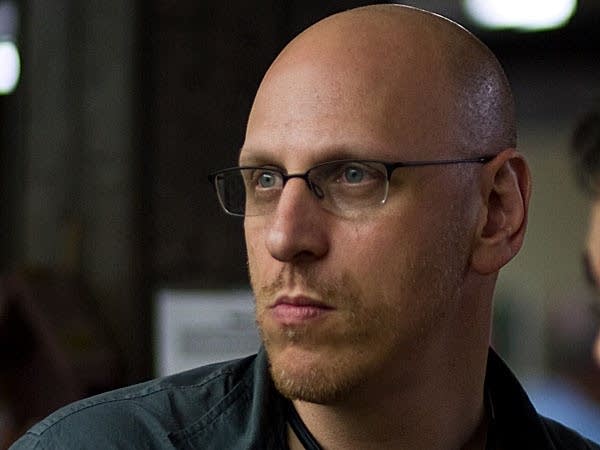The tale behind 'The Messenger'

Some people in the military say the toughest job they can get is casualty notification duty - telling next of kin about the death of a soldier. A new film opening in the Twin Cities this week called "The Messenger" tells the story of two soldiers on such a detail.
Director Oren Moverman took his cast on research trips to the Walter Reed Army Medical Center and to the Army's central casualty notification office.
"We spoke [with] who did notifications but also had experience in war," Moveman said. "Every single one said to us that they would rather go to war than notify a family of the death of a loved one."
"The Messenger" is the story of Staff Sgt. Will Montgomery, played by Ben Foster, an Iraq veteran newly returned to the US. He has almost, but not quite, recovered from physical injuries from a firefight in Fallujah. As for recovery from the mental trauma of losing close friends, that's an unknown.
Create a More Connected Minnesota
MPR News is your trusted resource for the news you need. With your support, MPR News brings accessible, courageous journalism and authentic conversation to everyone - free of paywalls and barriers. Your gift makes a difference.

He's paired up with Woody Harrelson as Col. Tony Stone, who fills him in on the rules of notification: only talk to the designated next of kin, keep to the approved script and deliver the news and leave.
"Avoid physical contact with the next of kin," Stone says. "Unless it's a medical emergency, like they are having a heart attack or something. You are representing the Secretary of the Army, not Will Montgomery, so in case you feel like offering a hug or something, don't. It'll only get you in trouble."
"I'm not going to be offering any hugs ... sir," Montgomery replies. "Is that it?"
"Once we finished a take, and finished a scene and we felt we had it, everyone started crying. It was very emotional."
"No, these are the rules. It's not the job," says Stone. "The job is about ... something else. You've got to do it before you can understand."
"The Messenger" has a complicated history.
Oren Moverman arrived in the U.S. after serving four years in the Israeli military, during which he saw combat, and became a screenwriter.
One day, sitting around his office with his writing partner Alessandro Camon, they began talking about the untold stories of the Iraq War, about the ordinary people who bear the brunt of the conflict. Moverman said it was Camon who first mentioned the casualty notification detail.
"And we thought in our own small way, why don't we try to shine a light on that part of the war, the home front, the families, the returning soldiers, and do it in a respectful, non-political way," he said.
Their script drew a lot of attention. Both Sydney Pollack and Ben Affleck were involved as possible directors, but then dropped out. Eventually, Moverman took the reins.
While there are no explosions or firefights shown in "The Messenger," it is a harrowing film. Again and again the two soldiers arrive on doorsteps to deliver tragic news. They try to stay focused and calm as an immediate and horrible chaos erupts around them.

Mostly it's debilitating grief, but in some cases there's rage and even violence. Oren Moverman said doing the scenes was tough.
"It was as intense as you can imagine," he said.
Moverman said he worked with actors Ben Foster and Woody Harrelson in a very particular way.
"First of all, we didn't introduce the people being notified to Ben and Woody, so there was a very raw immediate feeling to the scene because the first time they see each other is the first time they notify them," he said.
Moverman used a very small crew for the scenes, shooting them straight through with one handheld camera. He said Foster and Harrelson had to fight to maintain their composure.
"But once we finished a take, and finished a scene and we felt we had it, everyone started crying," he said. "It was very emotional."

"The Messenger" brought together some strange bedfellows: Moverman, the former Israeli paratrooper and outspoken peace campaigner Woody Harrelson. Moverman said it made for some interesting conversations on the set, and new understandings both for him and for Harrelson.
"Now through this process he's learned to separate the warrior from the war and understand that the war can be understood in political terms, but the warrior is a whole other thing," Moverman said. "It's not a political view that should influence your opinion of a soldier, but actually getting to know them and understanding the world they live in and the difficulties they face."
"The Messenger" has drawn great reviews, but it faces the challenge of overcoming the apparent reluctance of audiences to go see films about the Iraq War. However, Moverman said he believes the trauma of losing a loved one is something to which everyone can relate.
